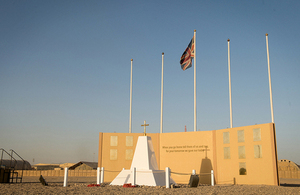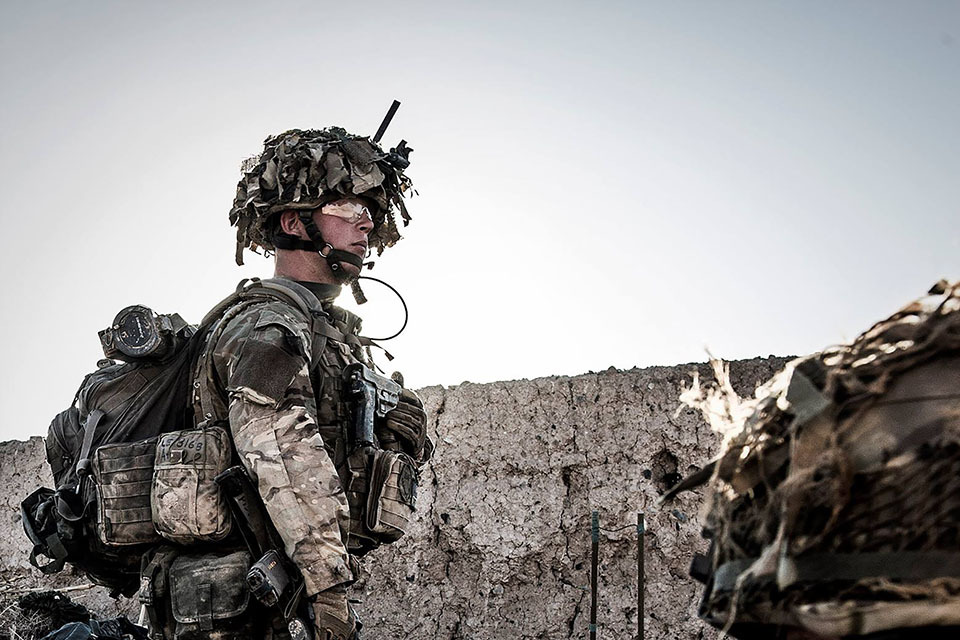Bringing the heart of Bastion back to the heart of the UK
In times of loss there’s often a need for a place to go and reflect, this wasn’t any different at Camp Bastion, Helmand Province, Afghanistan.

The original Bastion Memoria
The largest operational UK military base to be built since the Second World War, Camp Bastion began as a patch of sand with just a few tents in 2005. By 2013 it had transformed in to a 26km2 metropolis - the size of Reading. At its peak it was the home of almost 28,000 military and civilian personnel from the UK and its NATO allies.
During the conflict UK Service personnel began to honour their Fallen by building a memorial wall in Camp Bastion. The names of those who died during operations in Afghanistan were placed on plaques on the Bastion Memorial Wall, and it became the focus for remembrance and reflection throughout the campaign.
When the Bastion Memorial Wall was deconstructed alongside the camp in 2014, it bore the names of more than 450 UK personnel who lost their lives during 13 years of combat operations. Elements of the Wall have been brought back to the UK and incorporated into the new Bastion Memorial.
The Bastion Memorial unveiled as a year-round place to remember
On Thursday 11 June, the Bastion Memorial will be unveiled at the National Memorial Arboretum, Staffordshire in the presence of Prince Harry. A service will take place to dedicate the memorial and remember those who lost their lives, attended by family and friends of the deceased, including current members of the Armed Forces. After the event, the public can visit the Bastion Memorial year-round.

Soldier in Afghanistan
One of those who will be reflecting on their time in Afghanistan on 11 June is Major Thomas McDermott, of The Royal Tank Regiment. Major McDermott conducted more than 40 high-risk operations in Afghanistan and was awarded the Distinguished Service Order.
“He was a man with the heart of a lion, and his flame burned bright”
For Major McDermott , the Service of Dedication is particularly poignant. In 2013 Lance Corporal Jay Brynin, a member of the Brigade Reconnaissance Force under Major McDermott’s command, lost his life in combat and Major McDermott remembers:
“We were a very strong team and it was a tragedy to lose Lance Corporal Jay Brynin. He was a man with the heart of a lion, and his flame burned bright. He was a hugely positive influence within the Squadron, and every one of his colleagues felt his absence keenly. Our thoughts, as ever, remain with his family and girlfriend, and we seek to remember him always.”
When asked what the Bastion Wall meant to those serving in Afghanistan, Major McDermott describes the Wall as an important part of how they coped with loss:
It was the heart of Camp Bastion, and over the years it gave thousands of serving personnel a focal point for thought and remembrance. It was common, particularly after memorials and vigils, to see men and women spending time around it reflecting on their fallen comrades.
Bringing the heart of Bastion back to the heart of the country, Staffordshire, is exactly the right thing to do, sustaining the ability of family, friends and comrades to remember those they loved and lost. It really will help to ensure that we never forget.
Losses in Afghanistan touched every sailor, soldier and airman, and I have no doubt that the impact of the new Bastion Memorial across the military and the bereaved families will be inordinate.
The Service to dedicate the Bastion Memorial, and remember those who lost their lives during combat operations in Afghanistan will be held on Thursday 11 June at the National Memorial Arboretum, Staffordshire.
We invite you to remember and join in the conversation by using #BastionMemorial on Twitter. For more information on how to attend the service if you are a family member or how you can visit the memorial, please visit our website.